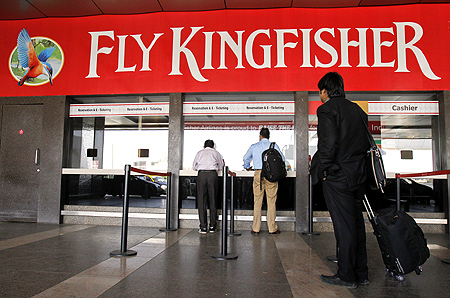 New Minority Affairs Minister K Rahman Khan strongly favours reservation for backward Muslims as well as for Dalits among Christians and Muslims notwithstanding the Supreme Court's observation on the sub-quota issue.
New Minority Affairs Minister K Rahman Khan strongly favours reservation for backward Muslims as well as for Dalits among Christians and Muslims notwithstanding the Supreme Court's observation on the sub-quota issue.
The minister also intends to carry forward reforms in the administration of Wakfs across the country and bring a revised bill for this in the winter session of Parliament.
Khan, who took charge of the ministry on Monday, told PTI that though reservation is "not a panacea", it is a "right" for people who are backward or discriminated.
Unfazed by the adverse court judgements on 4.5 per cent sub-quota for Muslims, Khan is confident that the orders merely reflect some "technical lapses" on part of government and does not amount to rejection of the sub-quota as such.
On the issue of minority sub quota rejected by the Andhra Pradesh High Court, Khan said, "That is the misunderstanding. The court has not rejected the quota. The court has only said that the procedure adopted to ascertain backwardness is not satisfactory."
Pointing out that reservation for minorities exist in Karnataka and Kerala, he said that reservation for minorities in Karnataka was based on the extensive surveys done to ascertain backwardness of Muslims.
"I feel that there were some technical lapses, which have been pointed out ìn the Supreme Court and the Andhra Pradesh high court judgements (on 4.5 percent sub quota). My ministry will study in detail the judgements. What are the technical reasons on which the Supreme Court questioned the order?
"We will try to address those issues and come out with a response.....Lack of sufficient data as to explain the socio-economic backwardness of the country has led to the court coming to the conclusion that it is a political move," Khan said.
Congress had promised to carve out a separate sub-quota for Muslims from the 27 OBC reservation quota, an order which did not find favour by the courts. (More) PTI AMR
Khan stressed that the rejection of the sub quota by Supreme Court and the high court was on "technical grounds".
"They have not said it was unconstitutional. The method adopted may be technically wrong. My ministry will try to set right the technical grounds on which it has been struck down," Khan said.
He, however, refrained from commenting on whether his ministry will make a fresh appeal in the Supreme Court on the issue, saying that he will take a decision after examining the matter in detail.
The Supreme Court has refused to stay the Andhra Pradesh high Court order quashing the December 2011 Office Memorandum of the government on the sub-quota.
The apex court also said that OM on the sub-quota issue did not have legislative support. The SC bench had also questioned the calculation of providing sub-quota, wanted to know whether there was any constitutional and statutory support for granting 4.5 per cent sub-quota.
Besides, it had questioned the government for not consulting statutory bodies like the National Commission for Minorities and the National Commission for Backward Classes in determining the sub-quota.
Replying to questions about efficacy of reservation as a tool to address discrimination, Khan said though he believes that "reservation is not a panacea" that will solve all problems plaguing a community, he believes "reservation is a right".
"If any section of the society remains backward or is discriminated, the Constitution has given the government the right under Articles 15 (4) and Articles 16 (4) under the Constitution to set right this discrimination or the unequal treatment.
"Once the government is convinced that a particular section has been discriminated or did not get equal opportunity, then that has to be set right through these articles," he reasoned.
Stressing that reservation is a "Constitutional right," Khan said, "It cannot be ruled out because once you have taken this route to set right discrimination faced by one section of the society then the other will also demand it."
On the vexatious issue of providing reservation to Dalit Christians and Dalit Muslims, he made it clear that he will work to see that this is done.
Noting that Dalits among Hindus converted to Buddhism, Sikhism, Islam and Christianity, he pointed out that benefits of reservation for the Schedules Castes were extended to converts among the first two religious groups in 1950 through a government order as it was felt their socio-economic conditions did not change after conversion.
"So probity and equality demand that there should not be any discrimination. If few people converted to a particular religion, they get benefits and others who convert to some other religions should not get. That is what has been challenged in the Supreme Court. It is a Constitutional right of those who have gone to the court," Khan said.
To a question on whether he will support the demand, the Union Minister said, "I will definitely....I will definitely look towards it".
He was, however, quick to add "the matter is before the Supreme Court.
"The government has left it to the court to decide...so let us wait for the Supreme Court order," he said when asked about allegations that the government was not keen on providing reservation to Dalit Christians and Dalit Muslims.
On the contentious issue of Wakf reforms, Khan said his priority would be to bring the revised bill to strengthen the management of Wakf boards across the country in the Winter Session starting from November 21.
"The select committee has submitted its recommendations. The new bill has to be there. I will try my best to pass the Wakf bill in the coming session of Parliament. That is my first priority," Khan said.
Khan said that it is necessary that the Muslim community invests in infrastructure development for education and "Wakf is an area, where resources are available".
The minority affairs minister said that a scientific study has not been done to identify schemes required for development of minorities.
"As the Deputy Chairman of Rajya Sabha also, I had spoken in Parliament about schemes not reaching people. Government is sincere about implementing schemes but there is some difficulty. All the schemes are implemented by the state government. If the state government fails, the blame comes on us that we have failed definitely. I am aware of the problems why it is not happening.
"I will try to see that schemes reach people and review if they are really helping people," Khan said, adding more stress should be given to develop infrastructure of education for minorities and for this, the community must come forward and invest.
"Motivating the community for this is a priority for me," he said, adding that even the Sachar Commission, which went into the issue of the backwardness of minorities, had suggested this.
"Whatever assurance my party has given to minorities in its election manifesto, I would like to implement them...in letter and spirit," he said, adding there is a need for a "scientific study" to find out what exactly is required to be done regarding the schemes for uplift of minorities.
Image: Newly appointed Minority Affairs Minister K Rahman Khan









 © 2025
© 2025